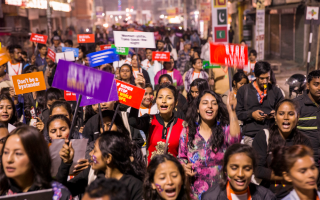The newly designed UN Resident Coordinator Office (RCO) Learning Path offers participants a rigorous five-month blended programme of interactive advanced high-impact online modules (emerging sustainable development issues and cross-cutting functional competencies) and a residential workshop at the UNSSC Knowledge Centre for Sustainable Development in Bonn, Germany. It combines two components, online and face-to-face, to ensure that all RCOs are part of a renewed community which shares expertise and know-how across a restored peer-to-peer learning virtual structure within the UN system.
On 1 January 2019 a reinvigorated RC system was rolled out, embodying the vision of the UN General Assembly to create a dedicated, independent, impartial and empowered development coordination function. Success is to be measured by improved, integrated policy advice, increased programmatic results, more efficient and agile operations, and greater transparency and accountability, inspiring a renewed commitment to multilateralism in line with the 2030 Agenda for Sustainable Development. Ultimately, the measure of success will be the impact for people, planet and prosperity.
Through a five-month journey, the RCO Learning Path facilitates an in-depth exploration of emerging sustainable development issues, reinforcing professional competencies and building on the power of collaboration, coordination, co-creation and communication as core abilities of the new skillset to deliver on the 2030 Agenda.
Participants will not only expand their knowledge, exchange best practices, and gain substantive insights on how to collaborate, co-create, coordinate and communicate more effectively. They will also follow a journey of virtual networking with other RCOS before meeting face to face, as the programme will conclude with a residential workshop in Bonn during fall 2021 (COVID-19 allowing).
In summary, this programme explores opportunities to acquire the latest information related to emerging sustainable development issues and RCO daily assignments, enables participants to meet new colleagues and experts, and builds competences to boost the RC system and the effectiveness of the UN development system as a whole.
After completing this programme, participants should be able to:
- Have a core conceptual framework on substantive issues and a new joint vision on competencies to be deployed in support of the UN system.
- Feel empowered to provide strategic support to the UN and partners to effectively address sustainable development issues.
- Apply the acquired substantive knowledge and competencies to deliver on the 2030 Agenda in their area of work.
UNSSC courses are designed to deliver maximum learning outcomes through carefully chosen high-quality learning materials. This course combines self-paced study modules with applied learning components, such as case studies, interactive exercises, collaborative group work, synchronous webinars, and a residential component tailored to the needs of RCO staff.
An expert facilitator guides and assists participants throughout the online component of the course, and provides real-time feedback on activities and exercises. Our user-friendly social online learning platform provides participants with the opportunity to connect with peers from diverse organizational backgrounds, fostering peer-to-peer learning.
Participants will benefit from live moderated webinars which feature inputs from renowned subject-matter experts and allow real-time dialogue with high-level speakers. Webinar recordings are made available to ensure that participants have a flexible and seamless learning experience.
Ultimately, the face-to-face component will strengthen the power of collaboration, coordination, co-creation and communication as core abilities of the new skillset to deliver on 2030 Agenda. Participants will apply their learning through experiential methodologies such as case studies, team discussions, and dialogues with UN senior staff and other speakers.
Average learning time per week is 2.5 hours including study time (depending on the week).
- High-Impact Online Modules:
- Emerging Sustainable Development issues: The 2030 Agenda and Transformative Pathways, Economic Transformation, Financing our Sustainable Future, Social Protection, Climate Emergency, Operationalizing Humanitarian-Development-Peace Collaboration, and Digital Transformation for a Sustainable World.
- Cross-cutting functional competencies: Systems Thinking, Theory of Change, Building Up Resilience, Data-Driven Evidence-Informed Policymaking for Sustainable Development, and Building Partnerships for Sustainable Development.
- Residential Workshop:
- Face-to-face workshop. The power of the 4 C's: Coordination, Collaboration, Communication and Co-creation.
RCO staff at professional level covering at least one of the five core functions:
- Strategic Planning
- Economics
- Data Management, Monitoring and Evaluation
- Partnership and Development Finance
- Communications and Advocacy
The course fee, covered by the United Nations Development Coordination Office (UNDCO), includes the following:
- Five-month online learning path with self-paced customized content designed to respond to the needs and challenges of RCO staff, including:
- 3-months' post-course access to course materials (including exclusive video material and key reading material), recording of webinars and speakers’ presentations.
- Participation in live webinars with renowned subject matter experts.
- Exclusive access to the UNSSC online social learning environment with training and supporting background materials, and the opportunity to stay connected with colleagues.
- All course materials, resources and contacts.
- Four days of residential workshop (location TBC) skills training with a balance of presentations, group work on case studies, and individual skills and reflection exercises.



